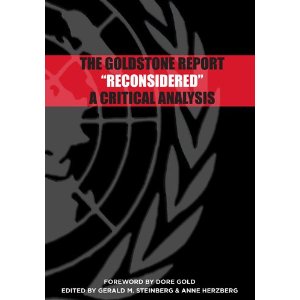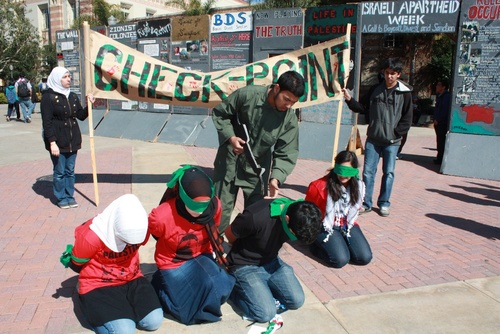Goldstone Reconsidered is a collection of essays highlighting and analyzing the multiple defects and deficiencies found in the September 2009 Goldstone Report (to the United Nations Human Rights Council) relating to Israel’s “Operation Cast Lead” in Gaza. The book’s eleven individual authors are mostly well-known academics or public figures (such as Alan Dershowitz, Irwin Cotler, and Moshe Halbertal) and several have very solid credentials in International Law (such as Cotler, Laurie Blank, and Abraham Bell). A twelfth chapter is a summary report following a gathering of international law experts conducted at Chatham House in London in December 2009.
For people disturbed by the harsh and shrill accusations against Israel contained in the Goldstone Report (hereinafter “G.R.”), Goldstone Reconsidered is a good starting point in understanding the serious flaws in the Goldstone Commission’s composition, methodology, and conclusions. The book is only a starting point because most of the essays were written in late 2009 and early 2010 in the immediate wake of the September 2009 G.R. As I will explain below, significant additional information is available that reinforces the critical points made in this book.
All authors in Goldstone Reconsidered are critical of the G.R.’s sweeping conclusion that Operation Cast Lead was part of a purposeful Israeli effort to harm the civilian population of Gaza. But these essays offer varied emphases and insights into the G.R.’s hasty attribution of malevolent intention and purposeful misconduct to Israel. Alan Dershowitz, for example, carefully deconstructs the shaky evidentiary foundation for G.R.’s conclusions about evil intent, emphasizing the total absence of evidence about actual military orders or policy. (Pp. 105-110). (Interestingly, Richard Goldstone himself has acknowledged that the G.R.’s sweeping conclusion about Israeli malevolent intent was based on dubious inferences rather than direct proofs. Washington Post, 4/2/11)
Other contributors to Goldstone Reconsidered strongly reinforce Dershowitz‘ observations about the G.R.’s predilections for making rash inferences about Israeli military conduct. Laurie Blank persuasively shows how law of war concepts like distinction (choosing military targets) and proportionality (avoiding excessive civilian collateral damage) are dependent on assessment of the information in the hands of military commanders; yet the G.R. made gross assumptions about intentional harm to civilians even though the Goldstone Commission had virtually no data about what Israeli commanders knew at the time of attacks. (Pp. 210-13, 222-31, 253). (Professor Blank notes, in passing, that Israeli non-cooperation made the Goldstone Commission’s work much more difficult, an issue to be picked up later in this book review). Several contributors contrast the G.R.’s willingness to infer malevolent intention from Israeli military operations with the G.R.’s stubborn refusal to infer wrongful intention from Hamas’ evident efforts to utilize civilian presence and infrastructure to shield combatants. Abraham Bell is particularly effective in exposing G.R.’s double standard of inferences as applied to Hamas’ placement of rocket launchers in or near civilian installations and its mingling of non-uniformed combatants with civilians. (Pp. 274-78). G.R., despite considerable contemporary reports and photos of Hamas’ use of ostensibly civilian structures for storage and firing of weaponry, lamely concluded that it could “not exclude” that Hamas had unnecessarily (and unlawfully) exposed Gaza’s civilian population to danger.
Goldstone Reconsidered usefully notes and explains the complexity of some legal issues concerning Gaza hostilities, and thus shows how presumptuous and superficial the G.R. was in accusing Israel of systematic violations of international norms including the law of war. The G.R. treats the Israeli blockade of Gaza as unlawful “collective punishment” of Palestinian civilians, yet it is self-evident that Israel has legitimate defensive reasons for screening for import of missiles and weaponry. (The U.N.’s Palmer Commission report of September 2011 as well as Israel’s Turkel Commission report confirm that there is significant legal support for Israel’s naval blockade as a legitimate security measure). Moreover, as contributor Abraham Bell notes, economic sanctions are a common tool in international relations even though they cause hardship to affected civilian populations. (P. 267). (Whether wisely or not, Israel was using a blockade to press Hamas to release Gilad Shalit – an Israeli soldier then being held hostage in return for release of convicted murderers of innocent civilians.)
Other complex legal issues blurred by the G.R. are usefully highlighted in Goldstone Reconsidered. For example, the book explains that while law of war principles demand distinction between military and civilian targets, the status of Hamas “civilian” ministries servicing Hamas’ military forces and Hamas’ “civilian” police force reinforcing Hamas combatants are highly problematic. (Pp. 168-73, 210-14). As noted, Laurie Blank lays out how the principles of distinction and proportionality demand inquiry into the data available to field commanders, yet the G.R., without any reference to Israeli field intelligence, regularly makes negative conclusions about unlawful malevolent intent or recklessness by Israeli field commanders. (Pp. 210-13, 222-31). Trevor Norwitz points out how even the status of Gaza as occupied territory is debatable given Israel’s prior withdrawal and Egypt’s simultaneous control of some entry points to Gaza. (Pp. 165-67).
While Goldstone Reconsidered does a fine job of highlighting evidentiary deficiencies and gaps in the G.R., the timing of the essays in late 2009 and early 2010 precluded a comprehensive effort to fill the gaps and correct the distorted picture depicted in the G.R. The authors of Goldstone Reconsidered generally acknowledge that a significant number of incidents considered in the G.R. demanded further investigation and clarification. But only a few of the authors mention, let alone incorporate, the most comprehensive Israeli response to the G.R. – a July 2010 Israeli Report titled Second Update on Gaza Operation Investigations (hereinafter “2010 Investigation Update,” found at http://goo.gl/me2lZ). That 2010 Investigation Update goes far to dispel, in the minds of fair-minded people, the gross G.R. suggestion that Operation Cast Lead was a purposeful effort to harm and terrorize the civilian population of Gaza. The G.R. stressed Palestinian civilian casualties near ostensibly civil installations such as a UNRWA school and the Al Maqadmah mosque as pointing to Israeli targeting of civilians. The 2010 Investigation Update lays out the operational scenario surrounding the casualties near facilities like the school and the mosque, explaining the military targets and objectives in each case. (Paragraphs 61-66, 69-73). The G.R. branded attacks on the Gaza police stations as targeting of civilians; the 2010 Investigation Update lays out some of the intelligence data for treating the Gaza police as intertwined with Hamas and therefore a legitimate military target. (Paragraphs 80-84). While the G.R. branded damage to civilian food supply enterprises such as a flour mill and a chicken farm as an Israeli effort to deny sustenance to the Gazan civilian population, the 2010 Investigation Update articulates the military data and the circumstances leading to the damage – clarifying that the Israeli military operations were in no way intended to interfere with the civilian food supply. (Paragraphs 124-28, 130-31, 142-44). See also a March 2010 report, “The Main Findings of the Goldstone Report Versus the Factual Findings,” Intelligence & Information Center, available at www.goldstonereport.org.
At the same time, the 2010 Investigation Update notes that some IDF misdeeds and miscalculations harming civilians did occur during Operation Cast Lead. The Israeli advocate general was involved in 47 criminal investigations leading to the prosecution of 4 soldiers and the discipline of 6 officers. (Paragraphs 41-42, 60). In addition, while the Update affirms that IDF standing orders did and still do “strictly prohibit” targeting of civilians and make proportionality a core principle within Israeli military doctrine, the Israeli investigations subsequent to Operation Cast Lead have led to changes in operational procedures to better insulate the civilian population from combat hazards and property damage. (Paragraphs 150-52).
As noted above, Goldstone Reconsidered is an appropriate starting point for refuting the rash charges leveled against Operation Cast Lead in the G.R. Effective refutation must employ more systematic data gathering along the lines of the 2010 Investigational Update. Of course, in some measure, all efforts to correct the false impressions flowing from the G.R. are too little too late. Despite exposure of its weaknesses and deficiencies, the G.R. will remain grist in the mill of the anti-zionist forces seeking to demonize Israel and undermine its legitimacy in a variety of forums. These forums include the biased U.N. Human Rights Council which commissioned the G.R. as well as some of the NGO’s and individuals pushing the BDS movement via the media, blogosphere, and college campuses. Another forum for exploitation of G.R. is the Arab street or masses which may ultimately shape the consequences of the so-called “Arab spring” being played out in Egypt, Tunisia, Syria, etc. One of the contributors to Goldstone Reconsidered, Richard Landes, reminds us of the willingness of the Moslem world to accept any vicious narrative about Israel as true. (P. 55). Trevor Norwitz, another contributor to Goldstone Reconsidered, rightfully fears that the libelous misconceptions of the G.R. have so taken hold that “truth will have no power against the venom and hate that have already been spread.” (P. 177). Even the belated efforts of Richard Goldstone himself to dispel the nefarious implications of the G.R. may be unavailing. When Judge Goldstone disavowed the G.R.’s conclusion that Israel had purposely targeted civilians (Washington Post, April 2, 2011), the disavowal was promptly dismissed as Goldstone’s craven submission to social pressure applied by Jewish friends. (Roger Cohen, N.Y. Times, April 8, 2011). The consolation for the contributors to Goldstone Reconsidered is that their efforts to discredit the G.R. may be useful in defending Israelis when and if the Palestinian Authority or others pursue prosecutions for alleged war crimes or other alleged international law violations in judicial forums such as the International Criminal Court or the International Court of Justice.
The Israeli government refused to cooperate with the Goldstone Commission, deeming the Commission’s mandate and membership too biased to allow a fair inquiry. Israel denied the Commission access to Israeli officials and failed to respond to written questions transmitted. In Goldstone Reconsidered, several contributors raise – and provide divergent answers to — the interesting question whether Israel should have cooperated in 2009. Gerald Steinberg is adamant that the refusal of cooperation was warranted. He finds “no basis” for speculation that Israeli cooperation would have mitigated the G.R.’s war crime allegations. He argues that, given the Commission’s biased predispositions, any Israeli submissions “would most likely have been twisted and distorted to suit the predetermined conclusions.” (P. 20). Trevor Norwitz concurs that the G.R. emerged so slanted that it “validates the view that the deck was so stacked against Israel that it was not worth playing the game.” (P. 162).
Contributor Moshe Halbertal, by contrast, concludes “it was a mistake on Israel’s part not to participate in the inquiry.” (P. 288). With 20/20 hindsight, I strongly agree. The Goldstone Reconsidered contributions from Laurie Blank and Chatham House elucidate how determinations about militarily justified targets and proportionality of possible civilian casualties were utterly dependent on the operational circumstances and information known by Israeli officers. (Pp. 235-41, 253; 91-97). Israeli failure to provide background information to the Goldstone inquiry about what the attacking forces knew and believed gave free rein to the Commission’s predisposition to make negative assumptions and inferences about Israeli conduct causing civilian casualties and destruction. Likewise, withholding of Israeli intelligence information about Hamas’ wartime exploitation and abuse of the civilian population of Gaza handicapped any inquiry into Hamas’ war misconduct. Sure, a balanced fact finder would have done far more than the Goldstone Commission to overcome the Israeli silence and to fill the gaps and would have refrained from sweeping legal conclusions on an inadequate evidentiary base. Sure, the Goldstone Commission was predisposed to making an indictment of Israel as a predatory state insensitive to human rights. Nonetheless, Israeli presentation of information might well have mitigated the G.R.’s conclusions about malevolent Israeli intent and policy. Richard Goldstone’s personal integrity has been widely conceded. Goldstone’s April 2011 personal retraction about Israeli targeting of civilians, based in part on information emerging subsequent to the G.R., tends to confirm his lack of personal animus toward Israel. (His recent editorial defending Israel against the accusation of being an apartheid state lends further credence to his lack of hostility.) Moreover, while the G.R. is shockingly unbalanced, it is not devoid of condemnation of Hamas. The G.R. acknowledged that many thousands of rockets fired from Gaza had been indiscriminately aimed at Israel’s civilians, and the G.R. branded Hamas’ violence against Fatah supporters a serious breach of human rights. (G.R., paragraphs 80, 103-105). Perhaps, had Israeli cooperation made more information available in 2009, the G.R. would have been more restrained in its Israeli related conclusions. We will never know. Sadly, the G.R. as written has already done incalculable damage, and Goldstone Reconsidered is left to be part of a valiant effort at damage control.
Norman L. Cantor, Professor of Law and Justice Nathan L. Jacobs Scholar Emeritus, Rutgers School of Law






